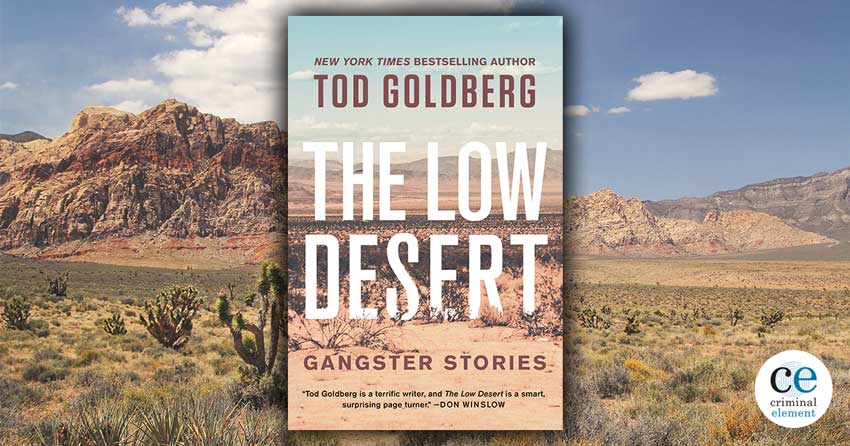Book Review: The Low Desert: Gangster Stories by Tod Goldberg
By Doreen Sheridan
February 8, 2021
Raymond Carver meets Elmore Leonard in Tod Goldberg’s The Low Desert: Gangster Stories, an extraordinary collection of contemporary crime writing set in the critically acclaimed Gangsterland universe.
If I’m being perfectly honest, most collections of crime short stories are … fine. Entertaining and good for a quick genre fix but often lacking in depth and memorability. Then, along comes Tod Goldberg and the 12 short stories that make up The Low Desert, and the bar for what I expect from books like this has climbed, perhaps unfairly, stories higher. Have pity, Mr. Goldberg, on all the metamodern prose stylists who will try to follow in your footsteps and fail to achieve anything as complex and subtle as your loosely connected, elegantly written Gangster Stories.
While a part of Mr. Godlberg’s celebrated Gangsterland series, this collection doesn’t require that readers have any familiarity with his other books (though, if you’re new to his writing like I am and only discover the connection between Rabbi Cohen and Sal Cupertine after finishing this, I can’t guarantee that you won’t yell out loud in amazement as I did). Established characters show up, often obliquely, as the action moves back and forth in time, traveling from the deserts of California to the high rises of Chicago. Most of our protagonists are terrible people, from two-bit criminals with murderous ambitions to ethically compromised law enforcement officers such as Morris Drew, the protagonist of several of these stories, including the one that gives the book its title. Morris, at least, is pretty clear-eyed about what he is when a desperate man tries to get him to back off from an investigation.
“Do you see a white and black Oldsmobile Starfire idling in the parking lot?”
I looked out the window. Took my time. An Oldsmobile Starfire was parked facing the sun, so I couldn’t see into it, but there it was. “Yeah.”
“If I don’t walk out of here in …” he looked at his watch, “nine minutes, they’re going to drive out to the Salton Sea and murder your wife. Is that what you want?”
“No, they won’t,” I said.
“You don’t know these kinds of people,” he said.
“Woody,” I said. “I am those kinds of people.”
Given my usual inclination to root for the good guy, it was perhaps ironic that my favorite story here was the one that featured the least apologetic and arguably most successful of those kinds of people, Goon Number Four. Our titular goon is a professional who applies the painstaking methods that made him such a good mercenary to life in academia. Violent and hilarious, it’s also the only one of these stories that turns predominantly towards hope and joy. The rest of the book is understandably grimmer, even when we’re not following criminals, instead peering into the life of a law-abiding waitress eking out an existence in Palm Springs or an FBI agent in Las Vegas who discovers that she has an aggressive form of cancer that will soon kill her.
But even these women have ties, deeper and occasionally unbeknownst to them, to the overriding topic of this book: the criminal underworld. Street hustlers run up against organized mobs, often to the detriment of the former, but even the well-established gangs aren’t immune to dissent and infighting. In “The Spare,” one of the first few stories here, the ostensible heir to Chicago crime boss Ronnie Cupertine takes issue with Ronnie’s vision for the future.
Ronnie [was] always going on about how if The Family was going to survive Nixon, half of their muscle in a fucking jungle in Vietnam, the other half in prison, it had to treat its business like McDonald’s, put up shop wherever there wasn’t somebody else. It was some shit he’d read in a book somewhere. So Ronnie had The Family going into small towns and blowing up what were effectively mom-and-pop shops, digging graves in Omaha to get into the meat business, which was really just a way to get access to big rigs for moving product across state lines, greasing small-town cops to look the other way on gambling setups around college football season, which was how they were getting to the extortion game with wealthy farmers, Billy thinking it was all too much, that McDonald’s got fries and burgers right, which is why they didn’t fuck with hot dogs.
All this other stuff? It was hot-dog business. It was how they were going to get caught, Billy thought.
Even if you didn’t know what lies in store for Billy’s son Sal before reading this book, the references to him in later stories here will still break your heart. I’m almost envious of people already familiar with the Gangsterland novels, for whom this collection will only bring deeper meaning and pathos to the fictional universe they already know. But even as a newcomer to the series, evaluating this collection on its merits alone, I deeply appreciated the skill it takes to build a world filled with haunted, broken people whose fragmented narratives tell a cohesive, absorbing tale of loss and love, leavened as in real life by laughter and the occasional leap of faith.
Each story in The Low Desert is razor-sharp on its own, but taken altogether, they make for a collection as searing as the hostile locale of the title. Mr. Goldberg plays with form to tell a new sort of gangster story, an examination of the lives organized crime touches and almost inevitably destroys. It’s one of the best collections of crime stories I’ve ever read and without a doubt the best collection of gangster stories I’ve ever enjoyed.
Comments are closed.

Great review thank you.